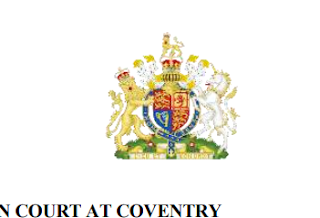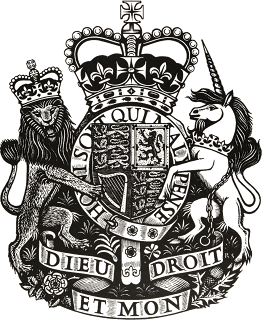The sentencing of Emma Tustin and Thomas Hughes for the abuse and murder of Mr Arthur Labinjo-Hughes, aged six, has rightfully attracted a great deal of public attention. The sentencing remarks of Wall J, as posted on judiciary.uk, may well become the rare court document to be widely read by the general public. For this reason, Wall J's stylistic choices in the judgment are likely to have an out-sized influence. Here, I comment on a select few of them.
Heraldic Matters
The distinctive character of the judgment (stylistically, anyway) was apparent from its first page. Generally, Crown Court sentencing remarks posted on judiciary.uk feature the stylised, abridged (lacking the compartment), monochrome version of the Royal Arms used by most public bodies (such as HM Government), as seen below:
Yet, for this case of the greatest public import, Wall J instead (apparently) elected to impress upon lay readers the authority and power of the judiciary by putting a full colour version of the Royal Arms at the head of his judgment. This is an interesting idea in theory, but failed, I regret to say (and with the greatest of respect to His Lordship), largely because the image used is, first, (very likely) the ghastly and garish version of the Royal Arms used by Wikipedia, and secondly, a rather low resolution copy of the same.
The end result is cartoonish and amateurish, and fails to have the proper impact (reminding all who read the judgment of the awesome power of the Sovereign as fons iustitiæ to dispense justice through the instrument of Queen's Justices). I also am not entirely convinced that colour is the proper method for strengthening the dignity of the Court in the medium of print. While heraldic tincture is essential when there is a physical set of arms being painted on an actual escutcheon, I think that, in print, colour is far less necssary. I challenge anyone to show me a coloured arms that can come close to the dignity and majesty of Reynolds Stone's version of the arms for the form and order of the Coronation of Her Majesty the Queen:
Even when on a screen, as opposed to in print (and I own the book with the original printing of this version of the Royal Arms by Cambridge University Press from 1953), this image cannot fail to impress its viewer of the might of the Crown. The cartoon atop Wall J's judgment, on the other hand, lacks this gravitas.
Honorifics (or, lack thereof )
Although witholding honorifics was once a marker of class distinction (ie, an upper class person might once have addressed a tradesman by bare surname rather than appending 'Mr'), today, everyone is generally accorded one as the most basic courtesy. Indeed, there is rarely any active intent for politeness in addressing someone as 'Mr Smith', because calling someone just 'Smith' seems rather odd. (Even at the Bar, where there was a long tradition of addressing other barristers by bare surnames, this behaviour would seem out of place in most sets today)
This current situation means that Wall J's decision to withhold honorifics from Tustin and Hughes (a decision I here copy) was a masterstroke of judicial style. The official contempt towards the inhumanity of these monstrous individuals was thus eloquently and efficiently conveyed. This was particularly true where His Lordship uused the defendants' surnames vocatively after the second person pronoun (eg, 'you, Hughes'). Given English's lack of a T/V distinction in the second person, adding the bare surname after 'you' is an innovative way to show disrespect (entirely deserved by the reprehensible defendants).
It is important to note here that Wall J's decision was unusual (though hardly unprecedented). For example, in another recent case of sentencing for the murder of a child, Yip J addressed the defendants as 'Miss Ion' and 'Mr Gulie', keeping the honorifics. However, I entirely agree that, in this case, Tustin and Hughes forfeited any hope of receiving optional courtesies, however small, from fellow human beings. They have made themselves anathema to polite society, and can thus expect little in the way of optional politeness (while still enjoying the mandatory standards of care for their welfare required by law). However, it is slightly disappointing that Wall J slipped in his habit and let one 'Ms' through at para 15. While foolish consistency may be, per Emerson, the hobgoblin of little minds, reasonable consistency is rather nice, particularly in official documents.
The Profane
In a case of such a heinous crime, obscene language is the least offensive detail emerging from these torrid facts. The general rule of judgments is, in the interests of transparency, to replicate uncouth phrasing verbatim rather than engage in censorship. For example, a recent edition of the Weekly Law Reports printed the phrase 'fucking evil bitch' without any censoring asterisks (seeM v D (Family Law Act 1996 : Meaning of 'Associated Person') [2021] EWHC 1351 (Fam); [2021] 1 WLR 5724, para 8, where MacDonald J was quoting the transcript of the decision below of DJ Colvin).
Wall J allowed the words 'fuck', 'fucking', 'shit', 'Satan' (for some believers, the most profane —as in not sacred—word), and 'Hitler' (granted not one usually censored, but it's hard to think of a more obscene human name). However, he censored the word 'cunt' (printed as 'c***' at para 4), and a word which I believe is 'cunting' (printed as 'c*****g' at para 9). A simple search on Westlaw or Bailii reveals that 'cunt' has appeared in more than a few English & Welsh judgments (as well as in other courts in the other jurisdictions in these islands), making the censoring somewhat anomalous.
One function of open justice is to provide an accurate and unflinching account of events of public importance. Wall J's judgment, as judiciary.uk correctly warned, contains graphic content. This was necessary because the public have the right to understand the full gravity (no matter how disturbing the details may be) of the offences for which Tustin and Hughes were sentenced. Given that Wall J spelt out in clear terms the particulars of the wicked abuse and murder of an innocent child, there seems little call to hold back one detail of its horror. The words censored are never polite, but to address them toward one's own child is the embodiment of an abusive, evil parent. The censorship serves to lessen the instant emotional impact of reading this account. While I would ideally have preferred to live in a world where the events described in the judgment never occurred and I thus never had to read its disturbing content, I believe that politeness cannot be an excuse to hold back from the public the sting and pain of hearing of Arthur's suffering. The language used by Tustin and Hughes should offend us, should anger us, should upset us, because it is precisely this emotional reaction which constitutes the human sympathy and decency which makes us different from these terrible criminals.



Comments
Post a Comment
Contributions are always welcome!